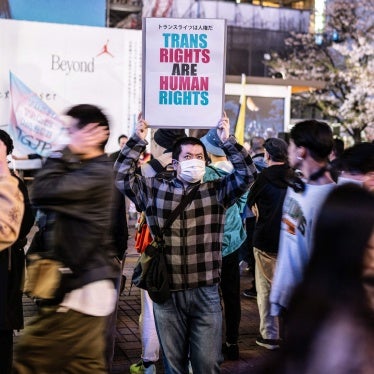TO:
Park Geun-hye, President of the Republic of Korea
CC:
Choi Kyoung-hwan, Acting Prime Minister of the Republic of Korea
Kang Sin-myeong, Commissioner General of the Korean National Police Agency
Gu Eun-su, Commissioner of the Seoul Metropolitan Police Agency
Dear President Park Geun-hye:
We write to express concern about the recent decision by the Seoul Police to deny permission for a gay pride parade. South Korea’s refusal to register the Seoul Pride Parade, scheduled for June 28, 2015, violates the country’s international legal obligations and should be immediately reversed.
Human Rights Watch is an international non-governmental organization that monitors the human rights situation in more than 90 countries around the world, including South Korea.
We are aware that on May 21, the Namdaemun district police station posted a special announcement on its gate to the effect that anyone wanting to register an event for June 28 (the planned date of the parade) would be allowed to start waiting in line. Activists and organizers of the Korean Queer Culture Festival and religious groups opposed to the Seoul Pride got in line and camped outside the police station for eight days. Both groups registered demonstrations and marches at the Namdaemun police, and the organizers also registered an alternative marching route at the Seoul Metropolitan Police. On May 30, less than 24 hours after the parade organizers submitted their request, the police refused to register marches of both groups on two grounds: the “possibility of inconvenience to pedestrian and vehicle traffic,” and itinerary conflicts with the route of the opposite demonstrators.
The South Korean government should protect the freedom of assembly and expression of the LGBT community and their allies instead of forbidding them to assemble and march on the streets of Seoul. Concerns about traffic disruptions are a weak excuse in light of prior large-scale rallies in this area, the fact the parade was scheduled for Sunday when traffic is lower. Parades, by their nature, disrupt traffic and a professional police force like the one in Seoul should be able to manage those disruptions, and even conflicting demonstrations, without resorting to shutting down the march. Last year, opponents took illegal direct action to block the pride parade route themselves by lying down in the street. This year, the Seoul police effectively gave those groups a veto over the parade, rather than finding a way to accommodate it.
The Seoul authorities’ failure to allow the LGBT pride parade is in stark contrast to the leadership role South Korea has taken internationally on LGBT rights.
At the United Nations, South Korea voted for both the 2011 and 2014 Human Rights Council resolutions that called for an end to violence and discrimination based on sexual orientation and gender identity and that authorized development of global reports on the status of LGBT rights. On June 1, 2015, the report mandated by the 2014 resolution was released by the Office of the High Commissioner for Human Rights. Regarding pride events, the report noted that: “In some States, such events are denied police protection or permits … abrogating the State’s duty to uphold freedom of assembly and to protect LGBT persons from violence.” The UN report called on governments to “protect the right to take part in the conduct of public affairs, without discrimination.”[1]
South Korea is party to the International Covenant on Civil and Political Rights, which guarantees the freedom of peaceful assembly and expression. This treaty obligates the government to secure effective enjoyment of those rights, which means taking appropriate measures to safeguard peaceful gatherings and protect them from others’ attempts to prevent or disrupt them. The South Korean government should fulfill its obligation to protect demonstrators in the nation’s capital – both by permitting the Pride Parade at a time and place that enables marchers to bring their views to the attention of the broader public in Seoul and by providing meaningful security during the events themselves.
The suppression of the Pride Parade, coming shortly after the issuance of a discriminatory new sex education policy that does not mention homosexuality[2], deepen our concerns about South Korea’s commitment to uphold the rights of LGBT people, who are entitled to equal treatment and protection of the law. We urge you to ensure that the Seoul police register and protect the Korean Queer Cultural Festival’s LGBT pride parade, and guarantee the safety and free movement of marchers during the event.
Sincerely,
Brad Adams
Asia director
Human Rights Watch
Graeme Reid
Lesbian, Gay, Bisexual, and Transgender rights program director
Human Rights Watch
[1] Discrimination and violence against individuals based on their sexual orientation and gender identity. Report of the Office of the United Nations High Commissioner for Human Rights. A/HRC/29/23. May 4, 2015.
[2] Human Rights Watch. Letter to the Government of South Korea on the Need to Recognize Sexual Orientation and Gender Identity in Sex Education. May 3, 2015: https://www.hrw.org/node/134700







